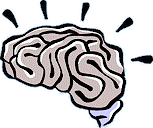 That sounds almost too good to be true: a food or supplement that can take 5 years off your brain's age?
That sounds almost too good to be true: a food or supplement that can take 5 years off your brain's age?
Further, Johns Hopkins University neuroscientist Marilyn Albert, who chairs the Alzheimer's Association's science advisory council, said, "folic acid offered significant brain protection" and added, "We know Alzheimer's disease, the pathology, begins many, many years before the symptoms. We ought to be thinking about the health of our brain the same way we think about the health of our heart".
We at BrainReady couldn't agree more, of course :)
Many scientists and health practitioners have long thought that folic acid may play a role in both dementia and Alzheimer's. Previous studies have shown people with low folate levels are more at risk for both heart disease AND diminished brain function.
So what is folic acid, or folate? Folate is found in such foods as...yup, you guessed it: dark leafy green vegetables and beans, as well as strawberries and even oranges. The "generally recommended daily dose" is 400 micrograms, but as shown in the Dutch study, 800 micrograms was the daily dose which showed the brain benefits.
So, are you getting enough? Well, the first place to look is your diet: if your daily diet is already rich with dark leafy green vegetables, beans, strawberries, oranges and the like, and is consistently that way over the years, you may already be getting enough from foods in your diet (and perhaps an additional boost from multivitamins or supplements you may already take, as well as from some folate-enriched foods that have folate added to them like some breads and cereals). But if your diet isn't so perfect, this is one area where taking a folic acid supplement might help, as shown by the Dutch study's results.
Fortunately, it's so easy to do, with folic acid supplements generally and widely available virtually everywhere, including high-quality food-based ones which some believe may be better absorbed by the body than the lab-manufactured variety.
Our opinion here at BrainReady is that many, if not most people could benefit from a folic acid supplement, as many people with fast-food tendencies and little dark leafy greens and beans in their diets are likely not getting anywhere near 800mcg of folate daily from their diet alone. And with brain and body health benefits as significant as has been demonstrated across so many studies, getting enough folate appears to be one area where the real-world difference is truly palpable, demonstrable, real.
You don't want to be deficient in this one.
Of course, as with any supplement, it's best to consult with your doctor or health care provider first before taking anything new, just to be safe (and to discuss optimal dosage for your particular case, diet, age, lifestyle). But given the combination of ready availability of folic acid supplements and general lack of adequate folic acid intake from food sources alone in the modern diet of most people, adding something that might effectively knock 5 years or more off your brain's age plus other benefits is...well, a no-brainer
(Another incredibly bad pun...terribly sorry).
- The Folate-Rich BrainReady Team
